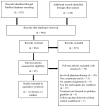A systematic review of treatments for problem gambling - PubMed (original) (raw)
A systematic review of treatments for problem gambling
Nancy M Petry et al. Psychol Addict Behav. 2017 Dec.
Abstract
Gambling problems impact 0.2%-4.0% of the population, and research related to treating gambling has burgeoned in the last decades. This article reviews trials for psychosocial treatments of gambling problems. Using Preferred Reporting Items for Systematic Reviews and Meta-Analyses Standards, we identified 21 randomized trials. Eleven studies evaluated interventions delivered via multisession, in-person therapy: cognitive therapies, cognitive-behavioral (CB) therapies, and motivational interventions (MI) alone or with CB therapies. An additional 10 studies used approaches that involved 1 or fewer in-person sessions; these included workbooks with CB exercises alone or in combination with MI and brief feedback or advice interventions. Although most studies found some benefits of CB therapy (alone or combined with MI) and brief feedback or advice relative to the control condition in the short term, only a handful of studies demonstrated any long-term benefits. Nearly half the studies used waitlist controls, precluding an understanding of long-term efficacy, and standardized outcomes measures are also lacking. Populations also differ markedly across studies, from nontreatment-seeking persons who screened positive for gambling problems to those with severe gambling disorder, and these discrepant populations may require different interventions. Although problem gamblers with less pronounced symptoms may benefit from very minimal interventions, therapist contact generally improved outcomes relative to entirely self-directed interventions, and at least some therapist contact may be necessary for patients with more severe gambling pathology to benefit from CB interventions. As treatment services for gambling continue to grow, this review provides timely information on best practices for gambling treatment. (PsycINFO Database Record
(c) 2017 APA, all rights reserved).
Figures
Figure 1
Records identified and reviewed.
Similar articles
- Systemic pharmacological treatments for chronic plaque psoriasis: a network meta-analysis.
Sbidian E, Chaimani A, Garcia-Doval I, Doney L, Dressler C, Hua C, Hughes C, Naldi L, Afach S, Le Cleach L. Sbidian E, et al. Cochrane Database Syst Rev. 2021 Apr 19;4(4):CD011535. doi: 10.1002/14651858.CD011535.pub4. Cochrane Database Syst Rev. 2021. PMID: 33871055 Free PMC article. Updated. - Drugs for preventing postoperative nausea and vomiting in adults after general anaesthesia: a network meta-analysis.
Weibel S, Rücker G, Eberhart LH, Pace NL, Hartl HM, Jordan OL, Mayer D, Riemer M, Schaefer MS, Raj D, Backhaus I, Helf A, Schlesinger T, Kienbaum P, Kranke P. Weibel S, et al. Cochrane Database Syst Rev. 2020 Oct 19;10(10):CD012859. doi: 10.1002/14651858.CD012859.pub2. Cochrane Database Syst Rev. 2020. PMID: 33075160 Free PMC article. - Smoking cessation medicines and e-cigarettes: a systematic review, network meta-analysis and cost-effectiveness analysis.
Thomas KH, Dalili MN, López-López JA, Keeney E, Phillippo D, Munafò MR, Stevenson M, Caldwell DM, Welton NJ. Thomas KH, et al. Health Technol Assess. 2021 Oct;25(59):1-224. doi: 10.3310/hta25590. Health Technol Assess. 2021. PMID: 34668482 - Psychological therapies for treatment-resistant depression in adults.
Ijaz S, Davies P, Williams CJ, Kessler D, Lewis G, Wiles N. Ijaz S, et al. Cochrane Database Syst Rev. 2018 May 14;5(5):CD010558. doi: 10.1002/14651858.CD010558.pub2. Cochrane Database Syst Rev. 2018. PMID: 29761488 Free PMC article. - Cost-effectiveness of using prognostic information to select women with breast cancer for adjuvant systemic therapy.
Williams C, Brunskill S, Altman D, Briggs A, Campbell H, Clarke M, Glanville J, Gray A, Harris A, Johnston K, Lodge M. Williams C, et al. Health Technol Assess. 2006 Sep;10(34):iii-iv, ix-xi, 1-204. doi: 10.3310/hta10340. Health Technol Assess. 2006. PMID: 16959170
Cited by
- Feasibility, Acceptance, and Safety of Metacognitive Training for Problem and Pathological Gamblers (Gambling-MCT): A Pilot Study.
Gehlenborg J, Bücker L, Berthold M, Miegel F, Moritz S. Gehlenborg J, et al. J Gambl Stud. 2021 Jun;37(2):663-687. doi: 10.1007/s10899-020-09975-w. Epub 2020 Sep 21. J Gambl Stud. 2021. PMID: 32955694 Free PMC article. Clinical Trial. - Fluoxetine combined with risperidone in treatment of online gambling disorder-case report.
Bai M, Huang E, Du H, Yang L, Zhang X, Yang Y, Yan Z, Wang W. Bai M, et al. Heliyon. 2023 Feb 15;9(3):e13772. doi: 10.1016/j.heliyon.2023.e13772. eCollection 2023 Mar. Heliyon. 2023. PMID: 36895358 Free PMC article. - Latent Classes for the Treatment Outcomes in Women with Gambling Disorder and Buying/Shopping Disorder.
Granero R, Fernández-Aranda F, Lara-Huallipe ML, Gómez-Peña M, Moragas L, Baenas I, Müller A, Brand M, Sisquellas C, Jiménez-Murcia S. Granero R, et al. J Clin Med. 2022 Jul 5;11(13):3917. doi: 10.3390/jcm11133917. J Clin Med. 2022. PMID: 35807202 Free PMC article. - Dropout from face-to-face, multi-session psychological treatments for problem and disordered gambling: A systematic review and meta-analysis.
Pfund RA, Peter SC, McAfee NW, Ginley MK, Whelan JP, Meyers AW. Pfund RA, et al. Psychol Addict Behav. 2021 Dec;35(8):901-913. doi: 10.1037/adb0000710. Epub 2021 Apr 22. Psychol Addict Behav. 2021. PMID: 34881915 Free PMC article. - An Examination of Comorbid Psychiatric Disorders in Disordered Gamblers Versus Other Substance-Related Disorders.
Nicholson R, Mackenzie C, Afifi TO, Keough M, Sareen J. Nicholson R, et al. J Gambl Stud. 2019 Sep;35(3):829-847. doi: 10.1007/s10899-019-09839-y. J Gambl Stud. 2019. PMID: 30778813
References
- American Psychiatric Association. Diagnostic and statistical manual of mental disorders (DSM-5®) Arlington, VA: American Psychiatric Publishing; 2013.
- Campos MD, Rosenthal RJ, Chen Q, Moghaddam J, Fong TW. A self-help manual for problem gamblers: The impact of minimal therapist guidance on outcome. International Journal of Mental Health and Addiction. 2015;14(4):579–596.
- Carlbring P, Smit F. Randomized trial of internet-delivered self-help with telephone support for pathological gamblers. Journal of Consulting and Clinical Psychology. 2008;76(6):1090–1094. - PubMed
- Chambless DL, Hollon SD. Defining empirically supported therapies. Journal of Consulting and Clinical Psychology. 1998;66(1):7–18. - PubMed
Publication types
MeSH terms
LinkOut - more resources
Full Text Sources
Other Literature Sources
Medical
Research Materials
